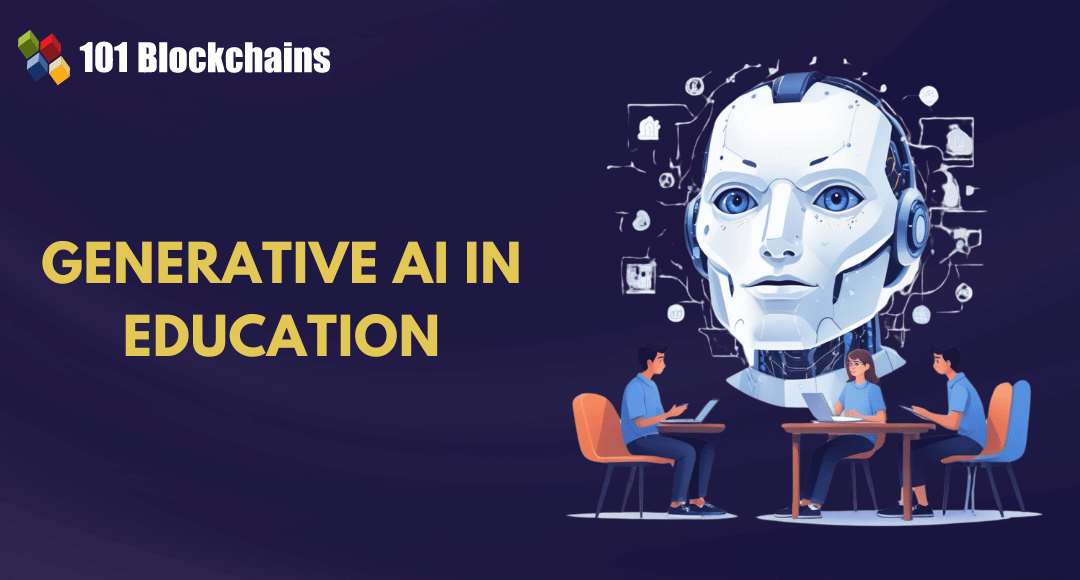Artificial intelligence made machines capable of understanding like humans. The arrival of generative AI ensured that machines could also talk to us like a friend, colleague or partner. The benefits of generative AI in education and many other sectors have drawn attention towards different generative AI applications. It is important to observe the ways in which generative AI affects the traditional domains such as education.
The impact of generative AI on education can set the precedents for encouraging adoption of generative AI in other sectors. In the aftermath of a global pandemic, digital technologies like artificial intelligence have emerged as the ideal solutions to improve education. Let us find out how generative AI can revolutionize education with an understanding of its use cases and examples.
Exploring the Background of AI in Education
You might have many questions about the uses of generative AI in education and their impact. It is important to understand generative AI uses in academics after finding out how AI became a part of the modern education landscape. The earliest examples of generative AI in the domain of education involved the use of basic AI algorithms for adaptive learning systems. One of the biggest breakthroughs in the use of generative AI for education came in the form of NLP techniques.
The education and teaching landscape is one of the foremost contenders in the race for adoption of generative AI. Artificial intelligence can leverage latest technologies in the form of deep neural networks, large volumes of computational power and massive datasets. Schools, colleges and other educational institutions can leverage generative AI to create new opportunities.
Understand the true potential of generative AI and become an expert with the Generative AI skill path
Discovering the Use Cases of Generative AI in Education
Generative AI can bring revolutionary changes in the domain of education when used in the right way. You must understand the top generative AI examples in education sector to discover what generative AI is capable of in different areas of education. The best thing about implementing generative AI in education is that it can help students and the teaching staff. Let us discover the most prominent use cases of generative AI in education with some examples.
-
Personalization of the Learning Process
Generative AI platforms work by collecting and analyzing data on the interactions of students with educational resources. The applications of generative AI tools in education can also help educators develop better understanding of the needs of each student. The most common use cases of generative AI in teaching draw attention towards the creation of personalized learning plans. Students can use generative AI systems to craft personalized learning paths tailored according to the performance of learners.
Let us imagine a scenario in which a generative AI app discovers that a student is unable to solve questions on mathematics. Generative AI can help the student by creating exercises according to their existing skills and provide feedback on their performance. The app can encourage the student to participate in the exercises by presenting unique challenges and interactive content.
-
Automating the Repetitive Tasks of Teachers
Teachers have to bear the burden of the responsibility to nurture the future of learners. Generative AI can help teachers in performing the most tedious tasks such as evaluation of tests with new grading software. You can also find generative artificial intelligence real life examples that showcase the potential of AI to transform the way teachers interact with students. Teachers can rely on generative AI tools for efficient assessment of essays and writing skills of students.
-
Designing the Curriculum with Generative AI
Generative AI also plays a crucial role in addressing the requirements of one of the most important aspects of education. The creation of curriculum is a difficult task amidst the continuous evolution of the knowledge base recommended for students. Artificial intelligence helps in personalizing the lesson plans for each student and can also support curriculum design. Generative AI can take different factors such as the interests, challenges and progress of students in a year for determining the ideal curriculum design.
Want to develop the skill in ChatGPT to familiarize yourself with the AI language model? Enroll now in ChatGPT Fundamentals Course
-
Planning for Resource Allocation
The applications of generative AI in education can not only improve the quality of learning but also streamline the management of institution infrastructure. Some of the answers to queries like ‘How does generative AI help in education?’ focus on the capabilities of AI to perform repetitive tasks. Generative AI use cases in education can support the planning of resource allocation to ensure resourceful use of stationery and learning materials.
-
Streamlining Crucial Administrative Workflows
Generative AI can help the administrative staff through automation of different tasks in their workflow. The adoption of generative AI can support the automation of student application processing, recruitment and facility management. Generative AI use cases in customer service can also create opportunities for faster resolution of queries by students and their parents.
-
Serving Continuous Support to Learners
Learners need continuous support along their learning journey in any discipline. Generative AI can offer continuous support to learners as a valuable companion by their side at all times. The most popular generative AI examples in education sector showcase how virtual AI-powered assistants guide learners through different aspects of the learning experience. Learners can ask any doubt to their generative AI assistant without the fear of being judged or apprehensions.
-
New Possibilities for Learner Engagement
The use cases of generative AI in the education industry also contribute to improvements in learner engagement. Different types of gamified learning platforms have emerged as the best examples of using AI to provide dynamic learning experiences. Generative AI can create personalized challenges for learners to encourage them to participate more in the learning process. The transition to more engaging learning environments proves that generative AI can make education more enjoyable and effective for learners.
-
Creating the Most Effective Content for Learners
The biggest strength of generative AI lies in its ability to create content according to user instructions. The list of generative AI uses in academics generally begins with the capability of generative AI tools to generate new content for learners. Generative AI can create interactive quizzes and educational games to support dynamic learning experiences. One of the examples suggests the use of generative AI to envision realistic scenarios personalized for each student to help them learn more effectively.
-
Supporting the Learning Journey of Teachers
Teachers have to adapt to the rapid pace of changes in the education sector, especially in terms of the evolving knowledge base and learner preferences. A review of generative artificial intelligence real life examples would also help in identifying the possibility of better training for teachers.
Generative AI can serve as a useful tool for creating personalized training modules for teachers to help them improve their teaching methods. The uses of generative AI also empower teachers to develop new skills that would help them with professional development.
Enroll in our new Certified ChatGPT Professional Certification Course to master real-world use cases with hands-on training. Gain practical skills, enhance your AI expertise, and unlock the potential of ChatGPT in various professional settings.
Unraveling the Potential of Generative AI in Real Life Examples
The examples of generative AI in real life can provide a clear impression of how the education sector can leverage generative AI. One of the most popular examples of generative AI in education is Duolingo. It is a popular application for learning new languages and uses generative AI to provide a learning partner for students.
The striking highlight of Duolingo is the motivation for users to complete daily exercises on the platform. The personalized learning approach involves using an initial positioning test for evaluating the skills of users. You can notice how it maintains a continuous challenge for learners to ensure that they are actively participating in the learning process.
Challenges of Using Generative AI in Education
Generative AI might have the capabilities to enhance the learning experience of users. However, the technology has some limitations which become more crucial in the education sector. The most prominent challenges in the use cases of generative AI in teaching revolve around security and privacy. Generative AI systems can serve as the primary targets for unauthorized access and potential data breaches.
The challenges of adopting generative AI in the education sector also indicate the possibilities of bias finding its way into learning experiences. Learners who use generative AI systems may end up learning from bias in the existing datasets without any awareness. Another formidable challenge of using generative AI in education is the chance of learners becoming extremely dependent on technology.
Become a master of generative AI applications and develop expert-level skills in prompt engineering with Prompt Engineer Career Path
Final Thoughts
AI has emerged as a reliable tool for improving the education sector. Therefore, it has opened new avenues to adopt generative AI. You can come across various generative AI examples in education sector that prove the power of generative AI. It can transform the learning and teaching experiences of learners.
Students, teachers and the administrative staff in educational institutions can make the most of generative AI to make the most of different advantages. The diverse use cases of generative AI for education showcase the prospects for creating a new education landscape. It is also important to pay attention to the challenges of embracing generative AI in the education sector. Find the most trusted and effective resources to learn more about generative AI applications in other sectors.










